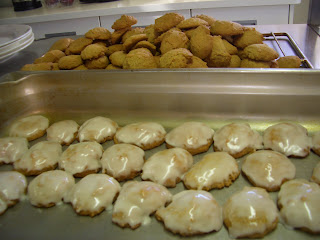LA
MOTTE RETAINS TITLE AS GREAT WINE CAPITALS WINNER, GRAND DEDALE WINS ACCOMMODATION AWARD
For
the second year in succession, historic wine estate, La Motte of Franschhoek is
South Africa’s Best of Wine Tourism champion. The 2013 winner of the annual
competition run by the Great Wine Capitals (GWC) once again came out narrowly
ahead of Waterkloof Estate, Helderberg’s biodynamic winery situated on the
slopes of the Schapenberg.
The
GWC, a network of the world’s leading wine-producing countries that shares
international best practice to advance standards in wine tourism across the
world, announced the results today (November 8) in Florence, Italy, at a gala
dinner attended by leading wine tourism practitioners from around the world.
GWC’s
members, in addition to Cape Town-Cape Winelands, include Mainz-Rheinhessen (Germany), Bilbao-Rioja (Spain), Bordeaux (France),
Florence (Italy), Mendoza (Argentina), Porto (Portugal), San Francisco-Napa
(United States) and New Zealand’s Christchurch.
Dating
back 300 years, La Motte as South Africa's national winner joins the
illustrious company of some of the world's most famous wine producers,
including:
·
France's Maison
des Vins de Cadillac, a leading Bordeaux winery run from an 18th century manor
house near the canton of Cadillac;
·
Wasems Kloster
Engelthal, a former Cistercian monastery in Rheinhessen, Germany, dating back
eight centuries;
·
Quinta do
Vallado Wine Hotel, one of the oldest estates in the Douro Valley of Portugal,
run by the same family for almost 400 years;
·
Spain's
Hotel-Bodega Finca de los Arandinos, close to Bilbao;
·
Italy's Fattoria
Lavacchio run as an organic operation in Tuscany;
·
Entre Cielos
Luxury Wine Hotel & Spa in the foothills of the Andes Cordillera of
Argentina;
·
The organically
farmed Long Meadow Ranch, nestled in the Mayacama Mountains of the Napa Valley,
US; and
·
Renowned
Yealands Estate in the Awatere Valley of Marlborough, New Zealand, a
carbon-zero winery that has been one of the world leaders in sustainable
farming.
As
the results were so close between the top two South African contenders, the
local chapter of the GWC sought the opinion of the full international panel
before making its final decision.
La
Motte's win was based on its overall performance, taking first place in the
Sustainable Wine Tourism category, and second position in both the Arts and
Culture and in the Wine Tourism Services categories. Last year the estate
earned the top score in the Arts and Culture category. Waterkloof’s position as
South Africa's runner-up was earned by coming first in the Architecture and
Landscapes category, as it did last year, and by coming second this time in
both the Sustainable Wine Tourism Practices and the Restaurant categories.
André
Morgenthal, spokesperson for the awards, said the virtual tie between La Motte
and Waterkloof was a reflection of the extremely high standard of entries. “The
difference between the scores was very slight. We had higher scores
across virtually all categories compared with previous years. It is very
encouraging to see that since the inception of the competition over a decade
ago, there has been a steady advance in the quality and sophistication of wine
tourism experiences entered for consideration.”
This
finding of the judges was borne out, he said, by the growing international vote
of confidence amongst tourists in Cape Town and its surroundings. Earlier
in November, Cape Town was named second-best city in the world and best city in
Africa by readers of US-based travel publication Condé Nast Traveller.
Its annual survey this year drew almost 50 000 readers and saw Cape Town beaten
only by southern US city Charleston, but coming out ahead of Florence, Bangkok,
Vancouver and Sydney.
Morgenthal
said this year, for the first time, the Hemel & Aarde area had been
represented in the local GWC competition, with Creation taking top position in
the Innovative Wine Tourism category.
Other
category winners were Grand Dédale of Wellington (Accommodation), Grande
Provence of Franschhoek (Arts & Culture), Tokara of Stellenbosch
(Restaurants) and Waterford of Stellenbosch (Wine Tourism Services).
This
year’s judges included wine tourism specialist Margi Biggs; international
tourism consultant Rick Taylor of the Business Tourism Company, a former CEO of
Cape Metropolitan Tourism and currently a board member of Tourism Business
Council of South Africa; lifestyle and wine journalist Joanne Gibson; Joan
Isham, the Biodiversity and Wine Initiative (BWI) extension officer; Marilyn
Martin, art historian, curator and writer; architect Alex Robertson; JP
Rossouw, food critic and author of the annual Rossouw’s Restaurants
guide; and landscape architect Johan van Papendorp.
Note
to the editor:
Winners
and first and second runners-up in each category were:
ACCOMMODATION
1
Grand Dédale
2
Grande Provence
3
Mont Rochelle
ARCHITECTURE
AND LANDSCAPES
1
Waterkloof
2
Tokara
3
Grande Provence
ARTS
& CULTURE
1
Grande Provence
2
La Motte
3
Delaire Graff
INNOVATIVE
WINE TOURISM EXPERIENCES
1
Creation
2
Vergelegen
3
Warwick
SUSTAINABLE
WINE TOURISM PRACTICES
1
La Motte
2
Waterkloof
3
Avondale
WINE
TOURISM RESTAURANTS
1
Tokara Restaurant
2
Waterkloof
3
Rust en Vrede
1
Waterford
2
La Motte
3
Delaire Graff





